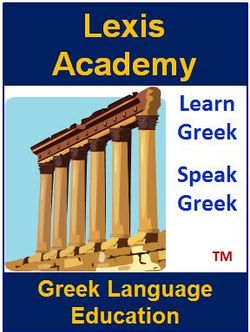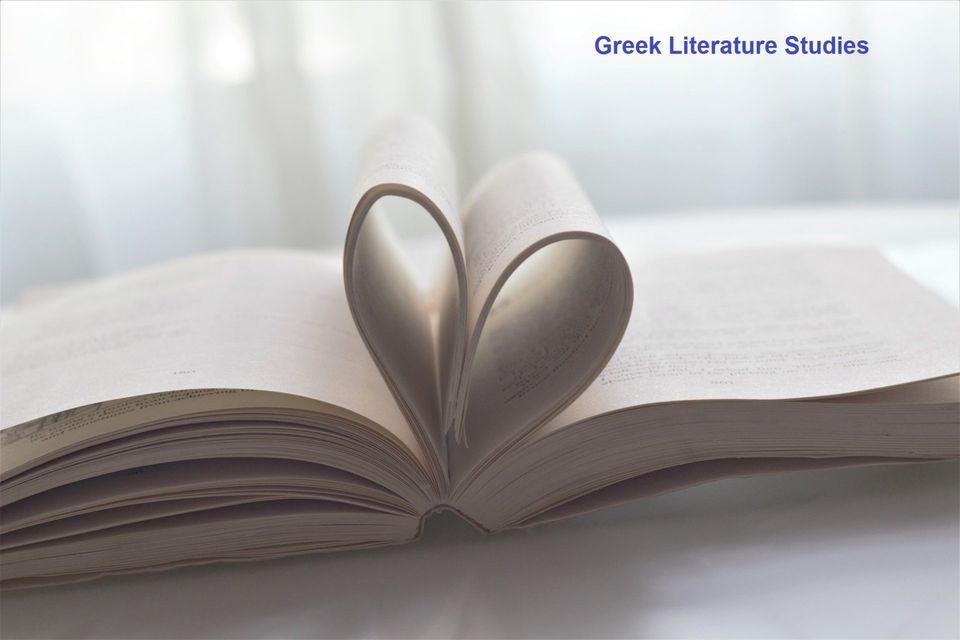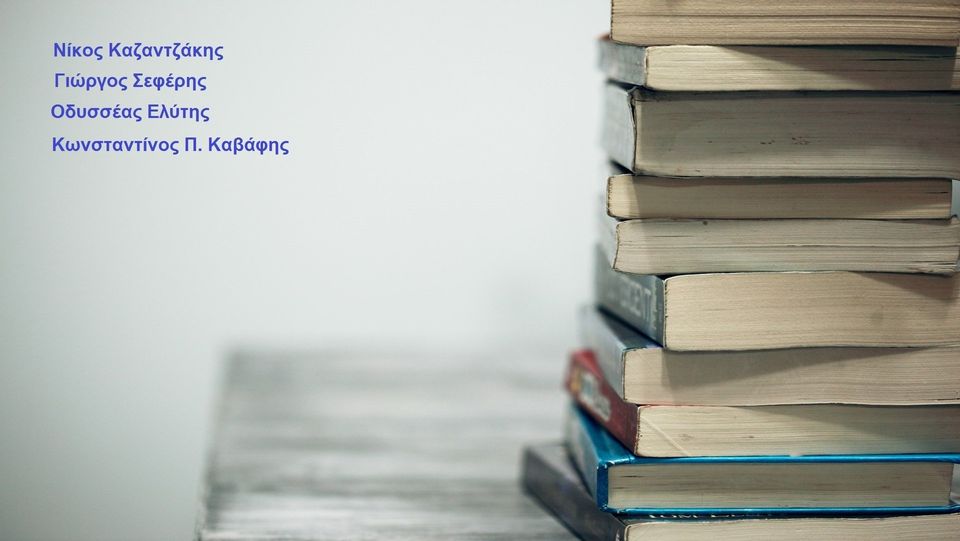Greek Literature Studies
PROGRAM OVERVIEW
Literature is a significant form of communication. With its unusual and even symbolic forms of expression, it enriches the spirit as it compels writer and reader alike to reach new horizons of interpreting and understanding the human experience. Language is the medium of literature, an instrument that the literary artist uses to construct and convey new meanings that are not necessarily bounded by the nuisances of grammatical and syntactical constraints.
The program of Modern Greek Language and Literature Studies covers an extensive treasure of prose and poetry from the early 1800s to the present day. Coursework is driven by an inter-disciplinary approach that comprises language acquisition, cultural awareness, and factual history.
Starting with a review of critical and literary theory and the historical development of Modern Greek Literature, students have the unique opportunity of developing their Greek Language skills by reading, deconstructing, translating, speaking, and writing about designated literary works.
Readings and supporting practice exercises, including vocabulary and grammar drills, stem from original compelling writings of a wide variety of authors who have influenced, and continue to affect, Modern Greek literary discourse, spoken and written language, empirical thought, and cultural identity.
Based on personal needs and the outcomes of placement tests, adult Greek Language Learners have the opportunity to enroll in the following beginner and intermediate courses that are designed to take the learner from the very basic vocabulary to complete mastery of Modern Greek for Business:
BGS100: Business Greek Beginner Level 1 (A1)
BGS200: Business Greek Beginner Level 2 (A1)
BGS300: Business Greek Intermediate Level 1 (A2)
BGS400: Business Greek Intermediate Level 2 (B1)
Historical Development of Modern Greek Literature
Modern Greek Literature was and continues to be characterized by a wider search for new themes, a renewed spirit of hope, and a genuine effort to interpret human existence in authentic speech and descriptive terms.
The consensus among scholars is that Modern Greek Literature can be grouped into the following seven (7) periods of development:
Byzantine Era and Frankish Rule
(1)
The Byzantine and post-Byzantine legacies that begin app. from 1000 AD and close with the Fall on Constantinople by the Crusaders in 1204.
(2)
The period of Frankish Rule, from 1204 until the Fall on Constantinople by the Ottomans in 1453. This period is referred alternatively as Λατινοκρατία, "rule of the Latins" and Βενετοκρατία or Ενετοκρατία, "rule of the Venetians".
Pre-Revolutionary Period
(3)
The pre-revolutionary period (1453-1821), consisting of the period from the Fall of Constantinople in 1453 until the takeover of Crete by the Ottomans (1453-1669), and from the Fall of Crete until the beginning of the Revolution (1669-1821).
The Revolution and the Ionian School
(4)
Literary works that were written and published during and after the War of Independence, until the end of the Age of Romanticism (1821-1880). Led by the Heptanese or Ionian School, representatives of this notable period include Dionysios Solomos and Andreas Kalvos, along with memoirs of leaders of the Revolutionary War.
The School of Athens
(5)
During 1880 until 1930, the School of Athens becomes the center of naturalism, realism, patriotic and folkroric literature. Chief representative is Kostis Palamas with his “Olympic Hymn” along with other nobable minds of the Parnassus Literary Society, including Grigorios Xenopoulos, Ioannis Gryparis, and Georgios Drosinis, The Parnassus Society
The 1930s Generation
(6)
The period of the 1930s was influenced by the modernist movement. It was during this turbulent socio-political period that the torch of excellent literature passed on to highly admired poets, (e.g. George Seferis, Odysseas Elytis), novelists (Elias Venezis, Stratis Myrivilis) and painters (Fotis Kontoglou, Yiannis Tsarouhis).
Post-WWII Period to the Present
(7)
The post-WWII period to the present: The works of Nikos Kazantzakis during the 1940s and 1950s gave voice to surrealism, which, during the 1960s, took a more political view (e.g. Vasilis Vasilikos). Since then, and continuing to the present, works of many fine novelists are characterized by non-conformism, the need to question, to doubt, to seek new pathways towards describing, and even redefining, the human condition.
Selected Authors
Among the many fine novelists and poets that decorate the pantheon of Modern Greek Literature, Nikos Kazantzakis, George Seferis, Odysseas Elytis, and Konstantinos Kavafis serve as inimitable beacons that shed an eternally bright light onto the Greek Language, history and culture.
Nikos Kazantzakis (1883 – 1957). Born in Heraklion, Crete, his voluminous work consists of the definitive 33,333 line poem “The Odyssey: A Modern Sequel”, six travel books, eight plays, twelve novels, and dozens of essays and letters in exquisitely inventive Demotic Greek. Two of his novels, “Zorba the Greek” and “The Last Temptation of Christ”, have been adapted to the cinema. In his autobiography “Report to Greco”, he wrote that there are three kinds of souls: One wants to work; one doesn’t want to work too much; and, one who solace in being overworked. Kazantzakis placed himself in the third category.
George (Giorgos) Seferis
(1900 – 1971): Born in Smyrna, Turkey, he was a career diplomat. Much of his work, such as “Ελένη” (Ellen) was inspired by the Homeric Epics and driven by his staunch stand against war and conflict. The philosophical, almost mystical, themes that he explored in Demotic Greek were also influenced by one of his intellectual heroes, T.S. Elliot. He used to describe his work as a vocation, of himself as an artist who “walks blindly, walks in the dark.”
Odysseas Elytis (1911 – 1996). Born in Heraklion, Crete, he was a poet and essayist who sought to integrate elements of surrealism with uniquely Greek themes. In free verses written in masterful Demotic Greek, he used creative imagination, analogies and personifications to describe historical events, personal reflections, and the natural environment around him. He referred to his work as the poetry of joy and optimism and a continuation of the Homeric legacy of story-telling through verse
Constantinos Kavafis (1863 – 1933). Born in Alexandria, Egypt, he wrote 154 poems that capture themes from the Alexandrine, Byzantine, and Roman periods. His poems exude philosophical, didactic, allegorical, and very personal tones. His rueful and aloof diction of Purist and Demotic Greek is unique and his painstaking attention to syntax, meter and rhyme masterfully distinct. In the words of the English novelist E.M. Foster, “A Greek gentleman in a straw hat, standing absolutely motionless at a slight angle to the universe.”
Some Reasons Our Students Study Greek Literature:
1] Literary Greek proffers
a deeper meaning of words, phrases, and sentence structures
that enrich the Greek Language Learner’s vocabulary and comprehension.
2] An additional benefit of studying Literary Greek is the
development of writing skills
as students engage in writing a review or a commentary that follows the author’s diction and syntactical conventions.
3] Gain a personal
understanding of the Greek culture, history, societal standards, customs, and ways of thinking that remain alive to the present day.
4] It is a learning experience that
expands the mind
by bringing to the surface questions that may have been previously hidden. It also opens the heart by building emotions, instincts and intuitions.
5]
Cultivate critical thinking
by seeking to uncover themes, understand the characters of the story and predict their actions.
6] Take a walk through a past period of time and
understand the historical events
described in the story. Understanding the past leads to a deeper appreciation of the present.
7]
Studying literature is
a character-forming experience
because a literary composition, a novel, a shorty story, or a poem addresses human nature and situations with which all people can relate.



